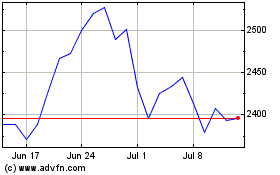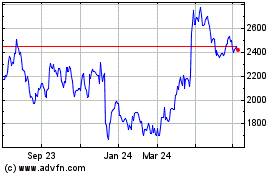By Scott Patterson and Alexandra Wexler
A year after Anglo American PLC announced one of the most
dramatic corporate downsizing efforts ever, the company is dialing
back its plan to sell off two-thirds of its mines and shed over
half its workers, a person familiar with those plans said.
Though Anglo found its cost-cutting plans tangled in South
African politics, the delay has helped the company take advantage
of a rebound in commodity prices during the second half of this
year -- especially in coal and iron-ore -- that have turned some
money-losing mines into cash cows, making it harder to justify
their sale.
While Anglo may still look to divest a number of its low-margin
mines, the pressure to dispose of a vast chunk of its assets has
eased.
After commodity prices plunged last year, Anglo unveiled what it
called a "radical" turnaround plan to sell as many as 29 mining
assets and an accompanying 85,000 workers over the next several
years.
So far, it has sold only nine of those mines and hasn't met the
$3 billion to $4 billion target for asset sales that its Chief
Executive Mark Cutifani set at the start of this year.
The dialed-back divestment plan highlights how the sharp rebound
in commodity prices this year has altered the fortunes of the
mining industry. Glencore PLC, which last year seemed on the verge
of imploding, recently said it had finished raising cash to
stabilize its balance sheet and then announced a big investment in
Russian oil giant PAO Rosneft.
Other big miners, including Rio Tinto PLC and BHP Billiton, have
seen sharp increases in their stock prices.
In 2015, Anglo was among the worst-suffering companies in the
global mining industry, which had been racked by almost three years
of slumping prices, and was teetering under $12.9 billion of net
debt. Anglo posted $5.6 billion in losses that year.
Now, its share price is up nearly 300% in 2016, and it is raking
in cash from its coal operations -- businesses it had planned to
sell.
The price of metallurgical coal, which is used in steelmaking,
has risen four times this year. Iron-ore prices are up 99% on the
back of stimulus provided by the Chinese government and cutbacks in
production in China, which consumes about 40% of the world's raw
materials.
Some analysts have called on Anglo to use money from rising cash
flows to pay down its debt instead of selling assets to raise
funds. Analysts expect the company to post positive cash flows in
2016, a sharp reversal from a cash outflow of $982 million last
year, according to FactSet.
Anglo continues to hold discussions with potential buyers. It
successfully sold a few of its assets before the commodity surge,
much of which came in the second half of 2016.
In April, it agreed to sell its Brazilian niobium and phosphates
businesses to China Molybdenum for $1.5 billion.
But the company is finding it hard to set a price on its assets
of late. Anglo was on the verge of selling some prized coal assets
in Australia this summer, but then the price of coal surged in a
matter of days, prompting Mr. Cutifani to pull back on the deal, a
person familiar with the matter said.
Not all buyers are convinced the commodity upturn will last, the
person said, and that has made many prospective buyers reluctant to
pay the higher prices Anglo is asking for.
"Mark will be looking at me and say, 'Is that the right price
for what you are selling?'" said Norman Mbazima, deputy chairman of
Anglo American South Africa, in an interview.
Despite their misgivings, "there's certainly no lessening of
pressure because of the price of commodities," Mr. Mbazima added,
referring specifically to Anglo's operation in South Africa.
Another complicating factor for Anglo is South Africa, where the
company had planned to sell as many as 13 of its 23 mining
operations.
Anglo is targeting coal mines there, some of which have low
profit margins, as well as aging iron-ore operations, which are
held in separately listed, majority-owned unit Kumba Iron Ore.
Despite their many ties, the South African government and Anglo
have had a strained relationship.
The South African government has made it clear that Anglo should
sell to homegrown companies or groups, but few enterprises in the
country can afford to buy Anglo's assets.
The government also has made it difficult for Anglo to cut
workers at unproductive mines. South African government officials
didn't respond to requests for comment.
"When you have to cut costs, it's not easy, when you have a
government that isn't being helpful and doesn't appear to like you;
you feel a bit lonely, isolated," said Ian Woodley, an analyst for
Old Mutual Equities in Cape Town.
Anglo recently has been involved in a price dispute with the
state-run power company, which buys some of its coal used in energy
production from the mining company. Eskom Holdings SOC accused
Anglo of overcharging for coal; Anglo has responded by saying it
charged a fair market price.
The Public Investment Corp., South Africa's state-run pension
fund, has been pushing Mr. Cutifani to spin off Anglo's assets as a
package that includes some coveted platinum mines, a move the CEO
has resisted.
The pension fund wields influence as the largest shareholder in
Anglo American, Kumba, and Anglo American Platinum, a
majority-owned unit of Anglo listed in Johannesburg.
The pension-fund manager declined to comment beyond an August
statement saying it was talking with Anglo about finding the "best
ways of maximizing value for all the stakeholders."
Write to Scott Patterson at scott.patterson@wsj.com and
Alexandra Wexler at alexandra.wexler@wsj.com
(END) Dow Jones Newswires
December 22, 2016 14:40 ET (19:40 GMT)
Copyright (c) 2016 Dow Jones & Company, Inc.
Anglo American (LSE:AAL)
Historical Stock Chart
From Mar 2024 to Apr 2024

Anglo American (LSE:AAL)
Historical Stock Chart
From Apr 2023 to Apr 2024
